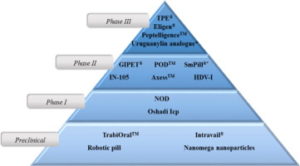 The development of oral dosage forms that allows absorption of therapeutic peptides to the systemic circulation is one of the greatest challenges for the pharmaceutical industry. Currently, a number of technologies including either mixtures of penetration enhancers or protease inhibitors and/or nanotechnology-based products are underclinical development. Typically, these formulations are presented in the form of enteric-coated tablets or capsules. Systems undergoing preclinical investigation include further advances in nanotechnology, including intestinal microneedle patches, as well as their combination with regional delivery to the colon. This review critically examines fourselected promising oral peptide technologies at preclinical stage and the twelve that have progressed to clinical trials, as indicated in www.clinicaltrials.gov. We examined thesetechnologies under the criteria of peptide selection, formulation design, system components and excipients, intestinal mechanism of action, efficacy in man, and safety issues. The conclusion is that most of the technologies in clinical trials are incremental rather than paradigm-shifting and that even the more clinically advanced oral peptide drugs examples of oral bioavailability appear to yield oral bioavailability values of only 1-2% and are, therefore, only currently suitable for a limited range of peptides.
The development of oral dosage forms that allows absorption of therapeutic peptides to the systemic circulation is one of the greatest challenges for the pharmaceutical industry. Currently, a number of technologies including either mixtures of penetration enhancers or protease inhibitors and/or nanotechnology-based products are underclinical development. Typically, these formulations are presented in the form of enteric-coated tablets or capsules. Systems undergoing preclinical investigation include further advances in nanotechnology, including intestinal microneedle patches, as well as their combination with regional delivery to the colon. This review critically examines fourselected promising oral peptide technologies at preclinical stage and the twelve that have progressed to clinical trials, as indicated in www.clinicaltrials.gov. We examined thesetechnologies under the criteria of peptide selection, formulation design, system components and excipients, intestinal mechanism of action, efficacy in man, and safety issues. The conclusion is that most of the technologies in clinical trials are incremental rather than paradigm-shifting and that even the more clinically advanced oral peptide drugs examples of oral bioavailability appear to yield oral bioavailability values of only 1-2% and are, therefore, only currently suitable for a limited range of peptides.